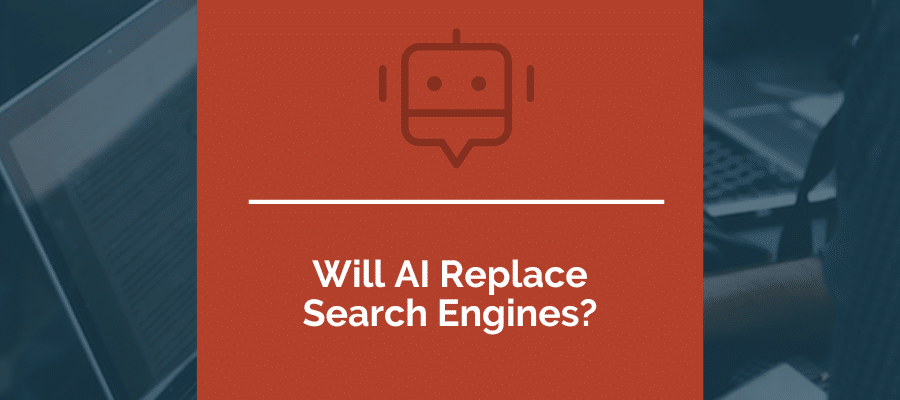Will AI Take Over Traditional Search Engines, and How Should Businesses Adapt?
Dec 18, 2024Explore whether AI will replace traditional search engines and discover strategies for businesses to adapt effectively to this transformative shift.
Will AI Take Over Traditional Search Engines, and How Should Businesses Adapt?
The rise of AI-powered search engines like OpenAI's ChatGPT and Google's Gemini is significantly impacting the search landscape, forcing businesses to re-evaluate their strategies. This article explores the evolving relationship between AI and traditional search, examining the potential for AI to replace traditional methods and offering guidance for businesses to adapt
The Shift from Traditional to AI-Powered Search
Traditional search engines rely on keyword matching to deliver results. AI-powered search engines, however, leverage artificial intelligence (AI) techniques like Natural Language Processing (NLP) and Machine Learning (ML) algorithms to understand the context and meaning behind search queries, delivering more relevant and nuanced results. This includes features like automated suggestions, tailored recommendations, and visual search options.
Examples of AI-powered search include Google's Search Generative Experiences (SGE), Bing's integration of ChatGPT, semantic search algorithms like Google's BERT, and e-commerce personalization using AI algorithms.
AI Search: Benefits and Challenges
Benefits of AI-powered search:
- Enhanced Relevance: More accurate and tailored results.
- Efficiency: Faster information retrieval.
- Natural Language Understanding: Conversational search capabilities.
- Personalization: Customized search experiences.
- Improved User Experience: Intuitive and user-friendly features.
- Scalability: Adaptable to changing user needs.
- Insights and Analytics: Valuable data on user behavior.
Challenges of AI-powered search:
- Bias and Fairness: Potential for biased results due to biased training data.
- Privacy Concerns: Data collection and analysis raise privacy issues.
- Complexity: High development and maintenance costs.
- Dependency on Data Quality: Inaccurate results from poor-quality data.
- Over-Reliance on Automation: Reduced human oversight and accountability.
Impact on SEO and Digital Marketing
AI is shifting the focus of SEO from keywords to context, semantics, and user behavior. Relevance, quality, and user experience are paramount. Websites offering personalized experiences and tailored content are more likely to rank higher. Businesses need to utilize AI SEO tools to leverage data analytics and user insights for optimization.
The rise of generative AI also introduces Artificial Intelligence Optimization (AIO), focusing on how to favorably position brands within generative AI tools' responses. This contrasts with traditional Search Engine Optimization (SEO) which focuses on search engine results pages (SERPs).
Will AI Replace Traditional Search Engines?
While AI is transforming search, it's unlikely to completely replace traditional search engines. Instead, a hybrid approach is more probable, with users employing both AI chatbots and traditional search engines depending on their needs. The speed and conciseness of AI chatbots are advantageous for quick answers, while traditional search engines remain valuable for in-depth research.

However, the shift towards AI-powered search necessitates adaptation from businesses. Focusing on high-quality, relevant content, personalized experiences, and leveraging AI tools for optimization are crucial for maintaining visibility and engagement. The future likely involves a blend of AI and traditional methods, requiring businesses to adopt a flexible and data-driven approach.
How Businesses Should Adapt
- Prioritize high-quality, user-focused content: Content that provides value and answers user queries effectively will remain crucial.
- Embrace personalization: Tailor content and experiences to individual user preferences.
- Utilize AI tools for SEO and marketing: Leverage AI-powered analytics and optimization tools.
- Monitor market share and trends: Stay informed about the evolving search landscape.
- Develop a data-driven culture: Invest in data analysis and interpretation capabilities.
- Explore AIO strategies: Optimize content for visibility within AI-powered tools.
- Stay updated on AI developments: Continuously learn and adapt to new technologies and trends.
Conclusion
AI is revolutionizing search, but it's not a complete replacement for traditional methods. Businesses that adapt by focusing on high-quality content, personalization, and AI-driven optimization will be best positioned for success in this evolving landscape. A flexible and data-driven approach is key to navigating the future of search.